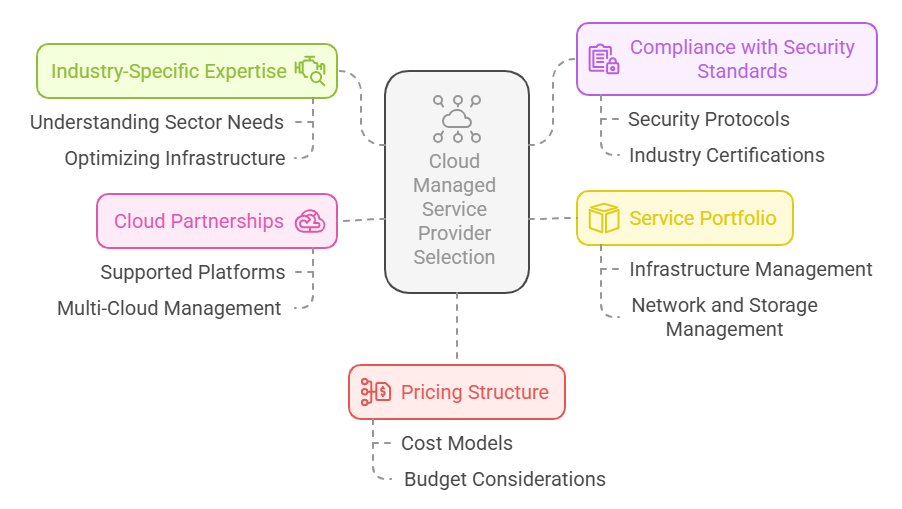What is a Cloud Managed Service Provider?
A cloud managed service provider is a third-party provider responsible for managing the complex IT operations of your private or public cloud environment. They optimize and maintain your cloud infrastructure by integrating the latest features and updates, helping you maximize its potential while reducing the technical burden on your internal teams.
From evaluating your existing cloud setup and continuously monitoring its performance to ensuring smooth operations and providing ongoing support, cloud service providers offer a complete range of managed services to tackle cloud security risks efficient, and up to date as per cloud computing trends.
Key Benefits of Cloud Managed Service Provider
Collaborating with a cloud managed service provider brings numerous advantages. Let’s take a closer look at them.
1. Reduce Operational Costs
Outsourcing the management of your cloud IT infrastructure helps cut expenses related to maintaining an in-house team. This eliminates the need for salaries, employee benefits, and ongoing training investments.
By partnering with a cloud-managed service provider (MSP), you gain access to flexible pricing models, allowing you to pay only for the services you require. Additionally, you can customize your service package based on your specific needs. For instance, if you only require network and storage maintenance rather than full cloud infrastructure management, you can tailor your plan accordingly and pay only for the selected services.
2. Access to Specialized Expertise and Skills
Managing your cloud IT infrastructure can be complex and requires advanced technical knowledge. Cloud-managed service providers have teams of certified professionals with expertise in cloud computing and platforms like GCP, AWS, and Microsoft Azure. They stay updated with the latest developments and ensure these innovations are effectively integrated into your infrastructure.
Additionally, they follow industry best practices to maintain and optimize your cloud environment. Their ability to quickly identify and resolve issues helps minimize downtime, ensuring smooth and uninterrupted operations.
3. Ensuring Business Continuity
A cloud-managed service provider plays a crucial role in maintaining business continuity through secure backup and disaster recovery solutions. With rapid data restoration capabilities, they minimize downtime and ensure your operations remain unaffected. Additionally, they implement failover systems to keep your infrastructure running smoothly even during unexpected disruptions. This makes reliability an essential factor to consider when selecting a cloud management service provider.
Beyond recovery solutions, cloud MSPs provide round-the-clock monitoring and support, proactively identifying and resolving issues before they escalate into major problems. By following these best practices, they help maintain a stable and efficient cloud environment, ensuring your business operates without interruptions.
What Challenges Do Companies Face During Cloud Migration?
The term cloud migration challenges refers to the hurdles businesses face when shifting systems, data, and applications to the cloud platforms. Key concerns include compatibility issues, data security risks, downtime during migration, regulatory compliance concerns, and costs of modernizing legacy systems.
Furthermore, the difficulties are not limited to the tech part only, as teams often deal with skill gaps. This happens due to their dependency on specific vendors and the complexity of connecting services across hybrid infrastructures.
For smooth cloud migration, businesses demand strategic planning, stakeholder buy-in, and thorough testing. Following these steps ensures safeguarding against interruptions meanwhile boosting scalability, performance, and data security in the new setup.
How to Choose a Cloud Managed Service Provider
Before finalizing your choice of a cloud managed service provider, it is essential to assess your options based on the following key factors.

1. Industry-Specific Expertise
It is advisable to select a cloud-managed service provider with experience in your specific industry rather than a general provider. Industry-focused MSPs have a deep understanding of your sector’s unique requirements and challenges, allowing them to address the issue more effectively. They can tailor and optimize your cloud infrastructure based on industry best practices, giving you a competitive edge in the market.
2. Compliance with Security and Industry Standards
It is crucial to verify that the cloud-managed service provider follows established security protocols, compliance regulations, and industry certifications. These certifications serve as evidence of the provider’s credibility, ensuring robust data protection and maintaining high operational standards.
3. Service Portfolio
Public cloud managed service providers help minimize downtime by proactively monitoring and resolving issues before they escalate. When choosing a cloud-managed service provider, evaluate the range of services they offer to ensure they meet your business needs. Check whether they provide the specific cloud management solutions you require.
An ideal cloud MSP should offer end-to-end services, including infrastructure management, network and storage management, and access control. Having a single provider that covers all essential services helps streamline operations and avoids the hassle of managing multiple vendors.
4. Cloud Partnerships and Support
It is essential to understand the provider’s cloud partnerships. You can explore their website or consult them directly to learn about the top companies they collaborate with. Ask key questions such as what cloud platforms they support and whether they are partnered with the cloud vendor you need assistance with, such as Microsoft Azure, Amazon Web Services or Google Cloud Platform.
Since many businesses operate in hybrid or multi-cloud environments or plan to in the future the provider should have the capability to manage multiple cloud infrastructures efficiently while ensuring seamless integration.
5. Pricing and Cost Structure
Pricing plays a crucial role when selecting a cloud-managed service provider, as it directly affects your business operations and budget. It is important to choose a provider that offers flexible and scalable pricing models, such as pay-as-you-go plans, allowing you to pay only for the services you use and helping you optimize costs. The overall cost may depend on various factors, including service level agreements, infrastructure complexity, management requirements, and the provider’s reputation.
Longer contracts might come with higher costs, though discounts may be available. Additionally, established providers may charge more due to their market position, while newer entrants might offer competitive pricing. To make the best choice, assess the cost in relation to the quality and range of services provided and adjust your budget accordingly.
Essential Tips for Choosing a Cloud Service Provider
Selecting the right cloud managed service provider is crucial for ensuring seamless cloud operations, security, and efficiency. With numerous options available, it’s important to assess various factors to find a provider that aligns with your business needs. Here are some key tips to help you make an informed decision for choosing cloud service provider.

1. Evaluate Your Existing Infrastructure and Define Your Needs
Begin by analyzing your current cloud IT infrastructure and its components. Identify areas where performance is lacking and determine the improvements you expect from a cloud-managed service provider. Communicate your requirements and objectives clearly to the provider, ensuring they understand the specific cloud-managed services you need.
Highlight the key areas that require enhancement and specify whether you need full management support or assistance with specific components such as networking or storage.
2. Conduct Research and Set a Budget
Once you have defined your goals, start researching top service providers based on your location and preferences, whether locally or remotely. Next, determine your budget by assessing how much you are willing to invest in a suitable partner. Evaluate potential providers against your key criteria and shortlist the ones that best align with your needs.
3. Ask Relevant Questions
When evaluating potential cloud service provider, consider asking the following questions:
-
- What certifications do you hold that demonstrate expertise in cloud platforms?
- How do you optimize costs and provide savings?
- What security measures and compliance certifications do you have to ensure data protection?
- How do you support new products, manage vendor relationships, and keep your engineers trained and certified?
- How responsive and knowledgeable is your support team?
- How effectively do you handle business disruptions and security incidents?
- How often do you conduct business meetings to review strategy and performance?
Feel free to add any additional questions you may have. Clarifying expectations with the managed cloud provider fosters trust and ensures a strong, long-term partnership.
4. Start with a Pilot Project
Once you have shortlisted potential cloud service provider, initiate a small pilot project to assess their capabilities before committing to a larger engagement. Give them a specific task or a limited portion of your infrastructure to manage for a short period. Evaluate their performance based on their ability to meet your requirements, deadlines, and budget, ensuring they align with your expectations.
Why Consider Azure Cloud Migration Services?
Top public cloud managed service providers offer services that include cost optimization, compliance management, and automated backups. When transitioning to the cloud, businesses must ensure a smooth, secure, and cost-effective migration. Azure Cloud Migration Services simplify this process by offering automated tools, security assessments, and scalability tailored to business needs. With an expert cloud managed service provider leveraging Azure’s advanced infrastructure, companies can minimize downtime, optimize workloads, and enhance operational efficiency.
Whether moving from on-premises or another cloud provider, Azure ensures a seamless shift with minimal disruption. Choosing an MSP with expertise in Azure Cloud Migration can significantly impact performance, security, cost savings, and plan cloud migration strategy. All these make it a critical factor when selecting a cloud partner.
The Role of AI in Azure Cloud MSP
Azure leverages AI capabilities throughout its cloud migration services with predictive planning, automated dependency mapping, and generative migration blueprints via Copilot. Businesses benefit from AI’s task automation capabilities and intelligent compliance mapping big time.
Besides, utilizing AI extensively enables Azure cloud MSP to enhance security and predict issues early. It maximizes resource output and provides quicker, more intelligent service delivery.
With Azure Arc, hybrid environments become more efficiently manageable, while sustainability and edge-aware migrations align with modern digital strategies. Through such advancements, the transition of outdated systems to modern ERP becomes easy, resulting in agile, scalable cloud-native architectures.
Why Partner with Intelegain for Cloud MSP Excellence
Choosing the right cloud MSP ensures optimized infrastructure, stronger performance, and better ROI. Compare providers based on strategic criteria and align them with your business goals for smooth, value-driven cloud adoption.
Intelegain empowers your cloud adoption with tailored Azure solutions, security-first strategies, and brings 25+ years of expertise. Maximize ROI, streamline operations, and future-proof your IT infrastructure. Ready to scale smarter? Contact us now for a free consultation and transform your cloud journey with confidence.
FAQs
Yes, cloud-managed service providers offer flexible solutions that can be tailored to your specific business needs. You can request customized services aligned with your goals and only pay for the features and support that are relevant to your requirements.
Yes, many cloud MSPs specialize in managing multi-cloud and hybrid cloud environments, providing effective integration and optimization across different platforms.
A cloud service provider (CSP) delivers cloud-based solutions, including infrastructure, platform, or software services, and is responsible for managing the underlying cloud infrastructure. In contrast, a managed cloud service provider (MSP) focuses on maintaining, optimizing, and securing your cloud environment, handling key aspects such as networking, security, and overall infrastructure management.
While choosing the right cloud MSP, you must consider several factors, including robust security, reliability, and platform expertise that fits your budget and compliance needs.
The role of AI in Cloud Managed Service Providers is to enhance automation, security, and efficiency by optimizing cloud operations and predicting potential issues.
Let’s Build Digital Excellence Together












